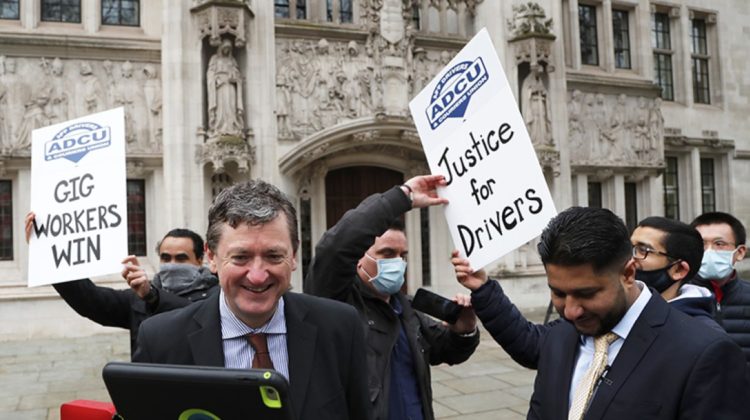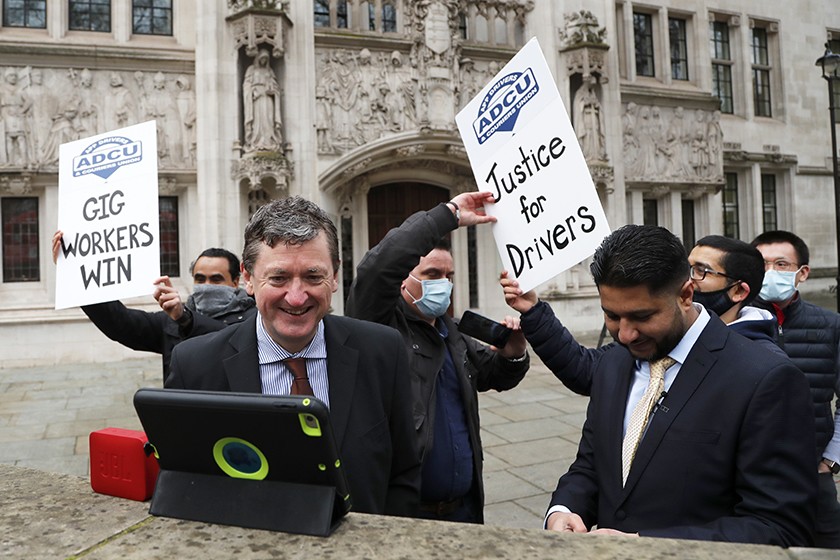

Uber and its fellow gig economy firms have been very successful in the U.S. at kicking up dust over whether their drivers are employees or — as the companies assert — independent contractors.
The highest court in Britain wasn’t fooled. In a unanimous ruling issued Friday, the U.K. Supreme Court found that Uber’s estimated 65,000 drivers in London are unmistakably employees. That renders the drivers eligible for a minimum wage and paid vacation.
The court further ruled that the drivers’ work time covers the entire period when they’re logged on to Uber’s app and therefore “on call” to pick up passengers.
The transportation service performed by drivers…is very tightly defined and controlled by Uber.
George, Lord Legatt
Uber customarily considers drivers to be working only when they’re on their way to pick up a rider and ferrying that rider to his or her destination.
The minimum wage in Britain, which is keyed to a worker’s age and experience, runs as high as the equivalent of about $11.50 an hour. The ruling makes the drivers who brought the case eligible for back pay, which a lawyer for the plaintiffs said could come to an average of about $16,800.
In the most immediate terms, the ruling is a blow to Uber’s business model in Britain. As in the U.S., that model depends on treating drivers as independent contractors and sticking them with expenses such as fuel, insurance and vehicle maintenance that would normally be covered by employers in a standard work relationship.
But it may also become a model for regulators elsewhere in Europe and beyond. The case may also forestall any effort by Uber to replicate overseas the egregious Proposition 22. That’s the California ballot proposition that placed Uber and other gig companies outside the reach of California labor law, which had held that the drivers were employees.
Uber, Lyft and other gig companies spent a stupendous $205 million in their successful campaign to pass Proposition 22 in November, making it the most expensive ballot campaign in American history. Proposition 22 effectively deprives Uber’s California drivers of such employment benefits as the minimum wage, workers’ compensation and unemployment coverage and the right to unionize.
The ruling may undercut Uber’s nascent campaign to persuade European lawmakers to conjure up a hybrid classification for workers — not quite employees, and not mere independent contractors.
In a white paper published days before the court ruling, Uber called on Europeans “to set a new standard for platform work … one where having access to protections and benefits doesn’t come at the cost of flexibility and of job creation.”
Followers of Uber campaigns in the U.S. will recognize some of this language as the company’s standard pitch — that drivers value the “flexibility” to set their own hours.
As studies have shown, however, drivers who resort to gig work only occasionally or as supplemental income tend to last only a few months before abandoning the work. Those who see driving for Uber or Lyft as full-time employment, however, tend to favor the benefits that would come from designation as employees.
Uber had lost three previous rounds in British courts during the five years it fought the lawsuit. The Supreme Court is the highest in the land, meaning that the company has no further opportunity for appeal.
The ruling, however, applies only to Uber, not to other gig companies, though the principles outlined in the unanimous decision by a seven-judge panel could ultimately be applied to gig workers and employers generally.
As had California courts prior to the passage of Proposition 22, the British court set forth in painstaking detail the features establishing that Uber’s drivers are employees.
Among other elements, the court found, Uber set standards of behavior for drivers and rated them according to rider feedback. It marked drivers down for canceling rides already accepted or accepting too few offered rides while they were logged on to Uber’s app.
Uber collected rider complaints and often resolved them without giving drivers an opportunity to respond, then unilaterally docked the drivers’ fare.
“It can be seen,” wrote Justice George Leggatt in the ruling, “that the transportation service performed by drivers … is very tightly defined and controlled by Uber.”
He observed that Uber’s control over the drivers’ services offer them “little or no ability to improve their economic position through professional or entrepreneurial skill,” which would be hallmarks of independent contracting.
Leggatt rejected Uber’s argument that it functioned merely as an agent bringing together drivers and passengers, meaning that it had no contractual relationship, much less an employment relationship, with the drivers.
The truth was that the company had implicit contracts with its drivers and its passengers. “It is difficult to see,” Leggatt wrote, “how Uber’s business could operate without Uber London entering into contracts with drivers.”
